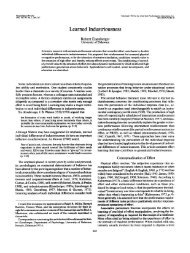Perceived Organizational Support
Perceived Organizational Support
Perceived Organizational Support
Create successful ePaper yourself
Turn your PDF publications into a flip-book with our unique Google optimized e-Paper software.
Coyle-ch10.qxd 1/16/04 3:00 PM Page 218<br />
218 Exchange Nature of Employment Relationship<br />
and infer POS more from the manner in which they are personally treated by the<br />
organization.<br />
As employees become more confident in their opinions concerning the regard in<br />
which they are held by the organization, favorable or unfavorable treatment of<br />
greater magnitude may be required to alter POS measurably. However, even after<br />
an employee has become confident of a given level of support by the organization,<br />
sudden changes in treatment having high symbolic or tangible importance would<br />
greatly influence POS. Examples would include unexpected promotions, demotions,<br />
or layoffs.<br />
10.6.3 Attributions of positive valuation<br />
The extent to which favorable or unfavorable treatment is perceived as discretionary<br />
has a major influence on the treatment’s contribution to POS. Eisenberger<br />
et al. (1986) noted several additional attributional heuristics that employees may<br />
use to gauge the extent to which the favorableness of treatment signifies that the<br />
organization values their contributions and cares about their well-being.<br />
First, favorable treatment that comes at a substantial cost to the organization<br />
would indicate greater positive valuation of employees than treatment requiring<br />
little sacrifice by the organization (cf. Gouldner 1960; Eisenberger et al. 1986). From<br />
this perspective, the establishment of a program to pay for employees’ education<br />
would contribute less to POS in a highly profitable company than a similar program<br />
in a firm with lesser fiscal resources. Second, OST suggests that treatment delivered<br />
at a time of great need to an employee should contribute more to POS than the same<br />
practice introduced at a time of lesser need (cf. Gouldner 1960). For example, material<br />
or socio-emotional aid given to an employee suffering from a life-threatening<br />
illness or grieving the loss of a family member would contribute substantially to POS.<br />
Similarly, the opportunity for employees to convey their opinions and suggestions to<br />
upper management might contribute more to POS while a tumultuous merger<br />
produces concerns for their future than during less stressful times. Moreover, when<br />
the organization responds benevolently to a variety of employees in times of great<br />
need and such aid becomes well known, the POS of employees not directly impacted<br />
by the organization’s benevolent actions might also be enhanced.<br />
In a related vein, OST proposes that treatment specific to an employee’s needs<br />
should be especially valued, and should therefore contribute considerably to POS<br />
(cf. Schopler 1970). From this perspective, certain types of favorable treatment may<br />
be more important in leading to POS for some employees than others. For instance,<br />
flexible scheduling may be more beneficial for a single parent of young children than<br />
for an employee without children or other substantial non-work responsibilities. As<br />
a result, flexible scheduling may contribute more strongly to POS for the former<br />
employee than the latter. As another example, favorable opportunities for promotions<br />
and career advancement may be more strongly associated with POS among<br />
employees with a strong need for achievement. These examples highlight the potential<br />
importance of employees’ attributional processes in the relationships of favorable



